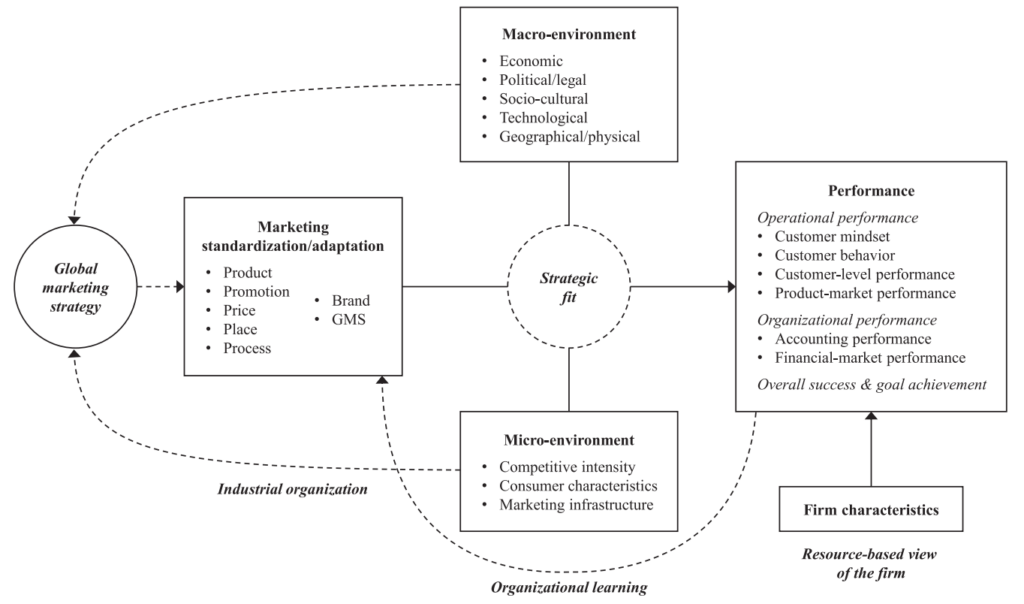The Standardization vs. Adaptation Dilemma
In today’s globalized business environment, companies of all sizes—from large multinational corporations to medium-sized enterprises and international start-ups—are increasingly generating significant shares of their revenues from markets beyond their home countries.
“Global market integration has moved questions about the standardization of marketing activities across different countries or regions to center stage for marketing theory and practice.”
Firms often consider standardizing their marketing programs and processes to increase overall efficiency and profitability. Standardization enables companies to capitalize on economies of scale in production, marketing, and R&D, shorten the time to market for new product innovations, and replicate successful products and practices across multiple markets. Despite these potential benefits, research findings on the impact of marketing standardization versus adaptation on performance remain inconclusive.
The fragmented picture that emerges from existing studies is largely due to the diverse conceptual and methodological approaches that underpin the research. This diversity makes it difficult to draw generalizable conclusions and provide reliable guidance to both international marketing researchers and practitioners.
Performance Consequences of International Marketing Strategies: A Systematic Review
To address this challenge, our research offers a systematic review of the existing literature, providing a clearer understanding of the performance consequences of marketing standardization and adaptation. Our review covers 68 studies published over the past three decades, focusing on the relationship between marketing standardization/adaptation and performance.
The review categorizes the existing research according to the type of marketing mix elements being standardized or adapted, the performance outcomes being measured, the contexts in which these strategies are implemented, and the theoretical frameworks that guide these studies.
A Bird’s Eye View on Three Decades of Research
The results reveal that much of the existing research lacks strong theoretical foundations, relying loosely on a few established theories. Additionally, the focus has predominantly been on multinational corporations and small- and medium-sized enterprises from high-income countries, particularly those producing consumer durables and industrial goods. The majority of studies have used survey data to estimate the impact of marketing strategies on product-market and accounting performance.
When Standardization and Adaptation Work
One of the central findings from the review is that the effectiveness of marketing standardization or adaptation is highly context-dependent. For example, standardization tends to be more effective for industrial products that provide functional benefits, while adaptation is often more successful for consumer products that fulfill emotional and symbolic needs. Furthermore, the success of these strategies is influenced by the market type—standardization may work better in high-income countries with well-developed infrastructures, whereas adaptation might be necessary in emerging markets where consumer preferences and regulatory environments vary widely.
Gaps and Future Research Directions
The systematic review also highlights several areas that warrant further research. There is a clear need for new, dynamic theoretical perspectives, such as dynamic capabilities theory, to better understand the relationship between marketing strategies and performance. Additionally, there are promising research opportunities in emerging markets, the digital services sector, individual marketing mix elements, and customer-related performance outcomes.
Strategic Implications for Practitioners
For practitioners, the findings offer guidance on how to approach the decision between marketing standardization and adaptation. Rather than treating these strategies as an either/or choice, companies should recognize that both approaches can be blended depending on the context. In some cases, a more standardized approach may be appropriate, while in others, adapting to local market conditions is essential. By carefully assessing the unique characteristics of each market, companies can develop a strategic balance that maximizes performance and meets the specific needs of their global consumer base.
Conclusion
As companies continue to expand their global footprint, the decision between marketing standardization and adaptation remains critical. This research underscores the importance of a balanced and context-sensitive approach, where companies align their strategies with local market conditions to achieve optimal performance. By leveraging the insights from this systematic review, businesses can better navigate the complexities of global marketing and drive success in diverse markets.
Disclosure: This blog post was created with partial assistance from AI tools.
Full reference: Mandler, Timo, Burcu Sezen, Jieke Chen, and Aysegül Özsomer (2021), “Performance consequences of marketing standardization/adaptation: A systematic literature review and future research agenda,” Journal of Business Research, 125, 416–435. https://doi.org/10.1016/j.jbusres.2020.12.023
Cite for: Marketing standardization/adaptation, international marketing strategy, systematic literature review, TCCM review protocol, journal selection criteria, performance outcomes, marketing standardization/adaptation-performance link (Figure 2), specific research gaps





